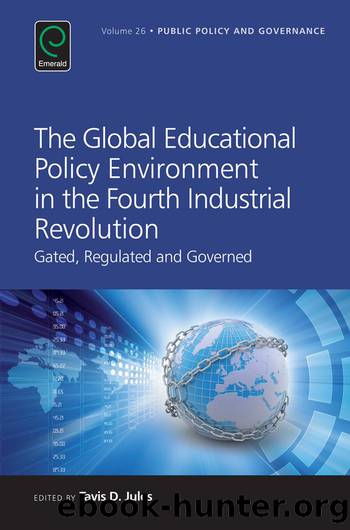The Global Educational Policy Environment in the Fourth Industrial Revolution by Jules Tavis D.;Berman Evan;

Author:Jules, Tavis D.;Berman, Evan;
Language: eng
Format: epub
Publisher: Emerald Publishing Limited
Published: 2016-12-18T00:00:00+00:00
EXTRA-TERRITORIAL GOVERNANCE MECHANISMS: TRANS-REGIONAL REGIMES AND SUPRANATIONAL ENTITIES
Unlike PPPs, epistemic communities, and other transnational actors in education, we also see the rise of âtrans-regional regimesâ (Jules, 2012), âinternational education regimesâ (Do Amaral, 2010; Tikly, 2016), and extra-territorial entities â such as, the African Union, Caribbean Community (CARICOM), Mercado Común del Sur (MERCOSUR), the Association of Southeast Asian Nations (ASEAN), and the European Union â that are now shaping the domestic education agendas of their members from the regional or supranational level. The educational landscape is transforming, as international, transnational, and regional organizations have become major players in governing the education policy field. Several authors have discussed the relationship between education governance and regime theory to explain the transformation and reaction of policymakers to education policy (Do Amaral, 2010; Jules, 2012, 2015; Tikly, 2016). In making such assumptions, these authors have drawn on Krasnerâs (1993) work on âinternational regimesâ to conceptualize âthe main concern of governance ⦠[by examining] the complex interrelations of action and coordination on various levels of analysisâ (Do Amaral, 2010, p. 59). Krasner (1993) argues that a regime is composed of a set of âprinciples, norms, rules, and decision-making procedures around which actorsâ expectations converge in a given issue areaâ (p. 1). Regime theory emerges in the 1970s as a way of denoting âsets of government arrangementsâ that include ânetworks of rules, norms, and procedures that regulate behaviors and control its effectsâ (Keohane & Nye, 1971, p. 19). Indeed, Jessop (1998) was prompted to write that âinternational relations has discovered âinternational regimesâ, i.e., a form of co-ordination which avoid international anarchy and yet by-pass the nation-state â and which has therefore been described as involving âgovernance without governmentââ (p. 31). Regimes in education are viewed as establishing frameworks (reducing transactional costs) and coordinate actorsâ expectations (improving quality and quantity of information available to states) as issues arise within any given policy space. Keohane (1983) notes that the âdenser the policy space, the more highly interdependent are different issues, and therefore the agreements made about themâ (pp. 155â156). Keohane (1983), in distinguishing between agreements and regimes, notes that agreements are ah doc âone-shotâ arrangements, whereas the purpose of regimes is to facilitate agreements. Similarly, Jervis (1983) argues that regimes â[imply] not only norms and expectations that facilitate cooperation, but a form of cooperation that is more than the following of short-run self-interestâ (p. 173). Thus, regimes do not arise on their own accord; they can be envisaged as âintervening variables standing between basic and causal variable and outcomes of behaviorâ (Krasner, 1983, p. 5). According to Stein (1993), regimes are based upon common interest or collaboration. Regimes in education have evolved as âarrangements peculiar to substantive issue-areas in international relations that are characterized by the condition of complex interdependence: neither hierarchy nor anarchy prevails and states really practice self-helpâ (Hass, 1993, p. 27). In fact, Do Amaral (2010) suggests that educational âregimeâ involved in the âgovernanceâ of educational services â⦠focus on the different conceptualizations of how sociopolitical regulation processes are coordinated among the different agents, be they public or privateâ (p.
Download
This site does not store any files on its server. We only index and link to content provided by other sites. Please contact the content providers to delete copyright contents if any and email us, we'll remove relevant links or contents immediately.
The Art of Coaching Workbook by Elena Aguilar(51160)
Trainspotting by Irvine Welsh(21638)
The Secret History by Donna Tartt(19048)
Twilight of the Idols With the Antichrist and Ecce Homo by Friedrich Nietzsche(18621)
All the Missing Girls by Megan Miranda(15946)
Cat's cradle by Kurt Vonnegut(15334)
Ready Player One by Cline Ernest(14639)
Talking to Strangers by Malcolm Gladwell(13346)
Fangirl by Rainbow Rowell(9228)
The remains of the day by Kazuo Ishiguro(8969)
The Compound Effect by Darren Hardy(8942)
Thirteen Reasons Why by Jay Asher(8893)
Tools of Titans by Timothy Ferriss(8363)
Periodization Training for Sports by Tudor Bompa(8253)
Wonder by R. J. Palacio(8097)
The Lover by Duras Marguerite(7893)
A Court of Wings and Ruin by Sarah J. Maas(7812)
Change Your Questions, Change Your Life by Marilee Adams(7758)
The Complete Stick Figure Physics Tutorials by Allen Sarah(7362)
